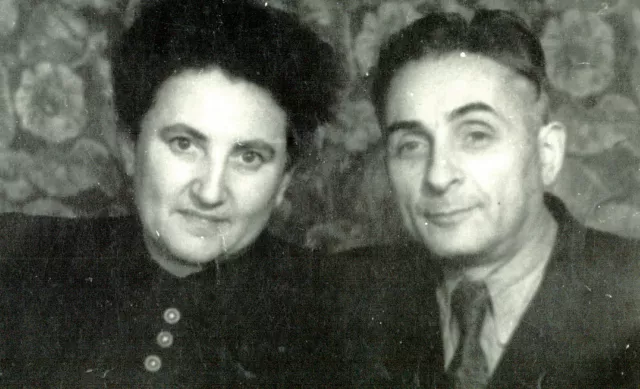Ludmila Pavlovskaya’s mother Clara Ioselevich and father Vladimir Pavlovskiy
My mother Clara Ioselevich and my father Vladimir Pavlovskiy in 1947 in Kiev.
From 1924 to 1929 my mother took all kinds of minor jobs and rented rooms from different landlords in Kiev. She was an agent in the proletariat newspaper "Communist". Her responsibility was distribution of badges with Lenin and Stalin. Later she was a cashier at a canteen and worked at the streetcar garage. In 1929 she got a job of a puncher at the factory of the 10th anniversary of October in Pechersk. My mother was a very good employee and a shock worker (udarnik in Russian) of labor. She had some privileges. The shops were empty and it was next to impossible to buy anything in stores. Udarniks of labor received special cards enabling them to buy goods without having to stand in endless lines and buy a certain food package in special stores once a week. My mother told me that she could buy 1 kg cereal, 2 kg bread, 2 tins of fish a week and 3 meters of cotton once in 3 months. It may sound funny for today, but at that time it was a lot. My mother worked at this factory 3 months and then the factory issued her a recommendation to the trade faculty for working young people (rabfak).
My mother studied at the rabfak for a year and then she entered the cooperative trade institute where my father was studying. My mother was a first year student and my father was a senior student. They met at the students' canteen. Students received coupons for a plate of soup and a piece of herring at the canteen. My mother said that my father always sat at the nearby table and kept looking at her. They were young and handsome. They got married in 1933. They had a civil ceremony. My mother made a gauze dress. They couldn't afford a wedding party. There was a horrific famine in 1933. My mother fell ill with tuberculosis and had hemoptysis.
My parents didn't take any vacations. They were working and work was their life. Many people lived according to the popular slogan of that time "You must first think about your Motherland and then about yourself". These were the people that could only work in the name of the right but rather illusory future and didn't know how to rest and care about themselves and their families.
My father was a textile commodity expert at the textile sales department. He was a quality assurance inspector for the fabrics manufactured at enterprises. He retired at 70. My mother didn't work for some time after returning to Kiev. In the late 1940s my mother got diabetes. She had few surgeries and she couldn't go to work. She distributed theater tickets for some time, but then she quit.
In 1964 my parents and I received a separate two-room apartment on the 5th floor. There was no elevator and it was difficult for my parents to go upstairs. But we were happy. I got a room of my own and my friends could visit me.
My father retired at 70 in 1968. He didn't work for a year. Life became more difficult. His pension was very small In a year my father had to go back to work. He worked as a lift operator, a janitor at a storage facility, at a printing house and a cloakroom. When he turned 89 I begged him to retire. He couldn't live without work. Staying at home was a problem for him. He was used to be among people. But at 89 he couldn't do any work at all. I had to take him to work and then pick him up to take home. My parents were my family. I dedicated all my time to them. My father died in 1990 and my mother died in 1995.














